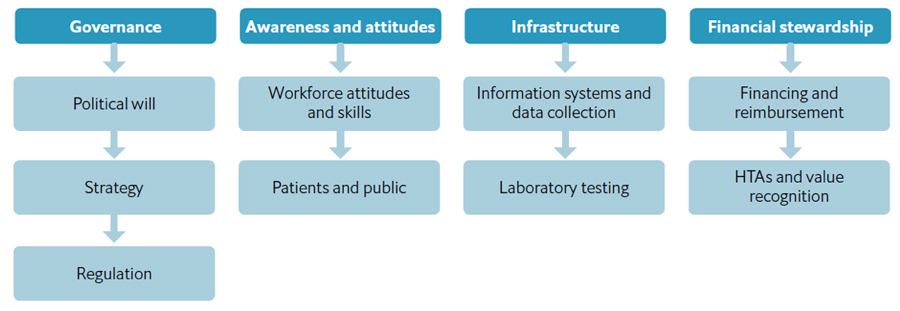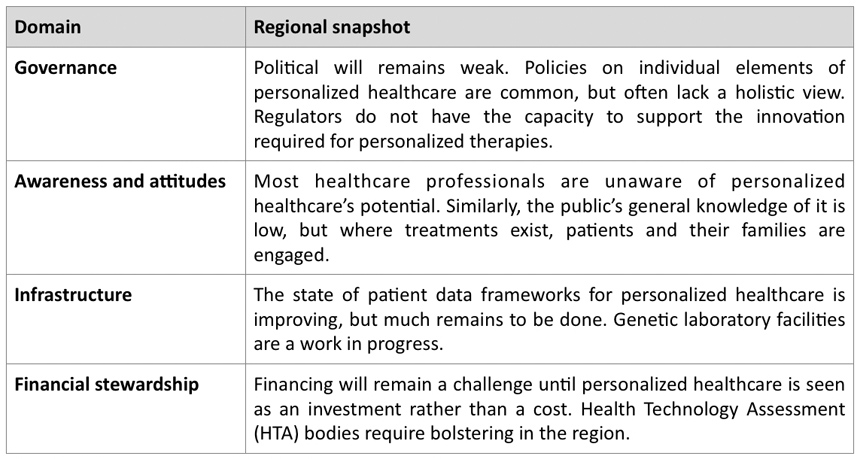Around the Globe
Institute of Clinical and Health Effectiveness, Argentina
Roche
Economist Intelligence Unit
Ex Health Minister, Colombia
President, Brazilian Society of Medical Oncology
ealthcare systems are under intense strain due to aging populations, increased prevalence of chronic diseases, and resource constraints. At this same time, the convergence of medical knowledge, technology and data science brings the potential to revolutionize healthcare. The delivery of care is shifting from the “one-size-fits-all” approach to the application of the right treatment for the right patient at the right time—so-called “Personalized Healthcare.”
In their report “Personalized Healthcare in Latin America: Universalising the Promise of Innovation,” the Economist Intelligence Unit describes the current state, barriers, enablers, and opportunity areas of personalized healthcare across nine countries: Argentina, Brazil, Chile, Colombia, Costa Rica, Ecuador, Mexico, Peru, and Uruguay. To fulfill the potential of personalized healthcare—better patient outcomes with more efficient delivery of care—healthcare systems must evolve in these countries, and the scale of change is significant. It will require strong collaboration among different stakeholders and an integrated approach that interconnects fundamental building blocks to create an ecosystem in which care is tailored to individual needs. The EIU report sets a call to action to policy makers. But is Latin America ready for Personalized Healthcare?
Introduction
A series of technological developments have increased clinicians’ ability to deliver personalized prevention and treatment plans:
- A growing ability to gather and store information in an integrated way; most importantly, in electronic health records that contain all data generated by an individual’s interactions with a health system as well as by their own personal tracking devices.
- An increasing understanding of and ability to gather patient information at the molecular level, including the genetic profiles of individuals, pathogens, and tumors.
- Ever more powerful analytical tools to sift through this information to understand its medical relevance at the individual patient level.
The challenge then becomes: How can we introduce these technologies into healthcare systems so that they can benefit all?
The new report by the Economist Intelligence Unit (EIU) on personalized healthcare in Latin America describes how countries in the region must create a framework that supports personalization, with a focus on the following four domains:

Personalized Healthcare in Latin America: Current State
While much is happening in the region—such as the National Genomics Data System in Argentina, the Precision Medicine initiative in Brazil, and development of a universal electronic registry and electronic health record system in Uruguay—many gaps to fill remain. These include:

Personalized Healthcare View from Medical Societies
Physician and patient access to innovative cancer treatments in Latin America is currently complicated by a series of barriers, mainly related to access. Precision oncology, for example, is mainly limited to the private sector. In order to improve access to all patients, it is necessary to implement programs for the public sector, funded by governments. These programs should include certain key features: in-depth genomic analysis of the patient’s tumor, interpretation of genomic test results, and access to high-cost drugs if eligibility criteria are fully met. This last one is necessary to ensure that low-income patients also have the chance to get high-quality care.
Latin America societies must create and disseminate policies allowing local politicians to approve laws to improve access to healthcare for excluded populations. This must include access to next generation anti-cancer drugs (such as high-cost targeted therapies) to improve cancer survival. Cancer clinical research should be oriented to establishing cancer biomarkers adapted to specific populations with different ethnicities, which would further improve patient outcomes in these groups.
Personalized Healthcare View from HTA Agencies
COVID-19 has dramatically shifted priorities in Latin America, both in the delivery of healthcare as well as research funding. The pandemic and its consequences will be an immediate focus for health systems over the coming months. However, longer-term challenges, many related to the fragmentation of healthcare systems and poorly aligned incentives, remain. Personalized healthcare therefore remains one of several priorities in our region.
HTA is challenging and complex in personalized healthcare. Strengthening technical capacity is paramount to improve the assessment of the wide range of research studies used in personalized medicine research. These are not typical studies that give half the patients one drug and another drug to the other half. Umbrella trials in oncology, for example, test different medications in patients with different health problems at the same time, since the inclusion criterion is a mutation and not a specific cancer. The challenge for HTA is how to adapt their assessment of benefit in such cases and how to gauge the potential added benefit in relation to costs that these therapies add to the system. The challenge is to fairly and equitably evaluate their cost-effectiveness and accessibility.
Personalized Healthcare View from Government
Health management is often not considered in developing long-term state policy and as a result many Latin American countries have little experience with or understanding of policies needed to support personalized healthcare. Therefore, both medium and long-term visions of the benefits of good population health are required: defining how policy can improve patient outcomes, deliver economic benefits, and increase both satisfaction and welfare. Patient organizations, working with healthcare professionals, are best placed to raise awareness of the need to incorporate the concept of personalized healthcare in governments and legislatures. This includes development of the systems and processes required for evaluation entities—such as HTA agencies—to appraise personalized technologies.
The EIU report suggested that personalized medicine development was coming to Latin America through specific “silos.” However, the region’s response to COVID-19 has shown that countries can act fast when there is a common cause, and the key is intersectoral systems working together.
Where Next?
Although each country has different specific challenges, the EIU report suggests the following:
- A coherent governance approach to personalized healthcare is needed so that appropriate interventions can be easily and quickly rolled out.
- Increasing public and specialist understanding of the mechanisms, potential, and limitations of personalized healthcare is essential.
- Countries must consider how to improve healthcare data and laboratory infrastructures to allow the adoption of personalized interventions.
- Officials should dismiss preconceptions that personalized healthcare is too expensive and instead invest in HTA processes that ensure informed decision making.
- Building these enabling frameworks will not only support personalized healthcare but will improve the function of the health system as a whole.

